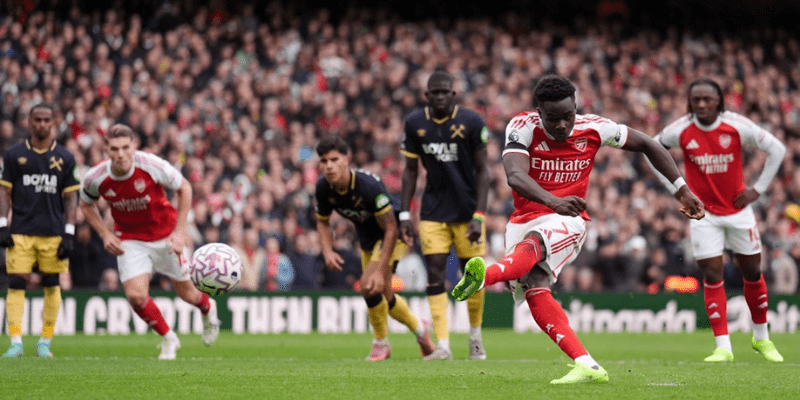CantoKick will walk you through the biggest win in Arsenal history, break it down across competitions, and spotlight some of the most brutal thrashings ever inflicted by Arsenal at home, away, in Europe and domestically.
The towering 12–0: Arsenal’s all-time high
The biggest win in Arsenal history is a staggering 12–0 margin — and it happened twice, in very different settings:
- In October 1893, Arsenal (then still near the start of their club story) beat Ashford United 12–0 in the FA Cup.
- On 12 March 1900, in the Second Division (League), Arsenal defeated Loughborough Town 12–0.
These two double-digit routs remain unmatched in the club’s annals as the largest winning margin in any competition.
While such lopsided results belong to a different era of football, they set the absolute ceiling for how dominant a Gunners’ performance can be.
Biggest wins in top-flight / league context

When we narrow it down to top-division league matches (First Division / Premier League era), Arsenal’s biggest single-match margin is smaller — but still eye-catching.
Home league record: 9–1 vs Grimsby Town
On 28 January 1931, at Highbury, Arsenal annihilated Grimsby Town by 9–1 in a First Division fixture. That remains their record league win at home in the top flight.
Biggest away league win: 7–1 at Aston Villa
Arsenal’s most dominant league win on the road came on 14 December 1935, when they beat Aston Villa 7–1 in the old First Division. It’s a benchmark that has lasted through decades of changing tactics and competitiveness.
Dominance across different competitions

Arsenal’s history spans league, cup, and European play. Their biggest wins vary depending on the battlefield.
FA Cup & domestic cups
- The 12-0 over Ashford (1893) is their FA Cup record.
- In the League Cup, they once smashed Leeds United 7–0 in the second round (4 September 1979).
- In FA Cup rounds, Arsenal also recorded an 11–1 win over Darwen on 9 January 1932 — one of their biggest in cup play.
European competition
Arsenal’s largest European margin is 7–0, achieved in multiple matches:
- In 1993, Arsenal beat Standard Liège 7–0 in the UEFA Cup Winners’ Cup.
- In the Champions League group stage, they once beat a team 7-0 (for example, against Slavia Prague in 2007).
These emphatic European wins show the Gunners’ capacity to dominate continental opposition when in full flow.
Top 10 biggest wins by margin — a snapshot

Here’s a distilled list of some of Arsenal’s highest-margin victories across history (non exhaustive but covering many of the standout matches):
| Margin | Opponent(s) & competition | Year / Notes |
| 12–0 | Ashford United (FA Cup) | October 1893 |
| 12–0 | Loughborough Town (Second Division) | March 1900 |
| 9–1 | Grimsby Town (First Division, home) | January 1931 |
| 8–1 | Liverpool (First Division, home) | September 1934 |
| 7–1 | Aston Villa (First Division, away) | December 1935 |
| 7–0 | Leeds United (League Cup) | September 1979 |
| 7–0 | Standard Liège (UEFA competition) | 1993 |
| 7–0 | Slavia Prague (Champions League) | 2007 |
| 7–0 | Everton (Premier League) | May 2005 |
| 7–0 | Middlesbrough (Premier League) | January 2006 |
This list demonstrates that while the ultimate 12-0 margin is unique, Arsenal’s biggest wins in modern top competitions tend to cluster around +6 to +8 goal margins in recent memory.
Why those early 12–0 wins can never truly be replicated
Several factors make the 12–0 wins unlikely ever to be matched again:
- Competitive balance — modern football has far greater parity. Giant scorelines are rare at all levels.
- Professionalization and squads — today’s lower league or cup teams at least field strong defenses and professional preparations.
- Tournament formats & rules — red cards, substitutions, tactical shifts, and more sophisticated defenses all help insulate stronger teams.
- Motivation & sportsmanship — once a match is decided, top teams often ease off to avoid humiliation.
Hence, while Arsenal have delivered some monumental wins in the top divisions and in European nights, none approach the margin of those two early 12–0s.
The modern era: biggest wins under Wenger / in Premier League
If we zero in on Arsenal’s modern era — Premiership / top-flight from 1992 onward — these matches stand out:
- 7–0 vs Everton (11 May 2005) — Arsenal’s biggest Premier League home win.
- 7–0 vs Middlesbrough (14 January 2006) — another pairing of dominance on home soil.
- In continental play, the 7–0 European wins already mentioned highlight that Arsenal have matched those large margins even in more balanced tournaments.
But even in the Premier League era, a +7 goal margin is extraordinarily rare and remains among their greatest showings.
Legacy and impact
Those gargantuan wins do more than pad the record books. They become lore — matches that fans recount with pride, rivals dread, and club historians return to.
- The 12–0 routs speak to a time when football was new, tactics still primitive, and mismatches more frequent — yet they remain permanently etched in Arsenal’s DNA.
- The 9–1 at Highbury in 1931 is often recalled by older generations as an example of Arsenal at their swaggering best.
- In the modern era, measuring successes by +7 margins in top competitions highlights Arsenal’s capacity for exceptional form when everything clicks.
These games also serve as benchmarks against which future teams are measured — how often can you truly dominate an opponent in 90 minutes?
Conclusion
The biggest win in Arsenal history remains the 12–0 scoreline, twice achieved — over Ashford United in the FA Cup (1893) and Loughborough Town in the Second Division (1900). Those early era results stand unmatched in margin, even as Arsenal have delivered outstanding performances across league, cup, and European competition over more than a century.
With every new season, supporters and analysts await another night where the Gunners might electrify the scoreboard. For more deep dives, player stats, records, and match histories, CantoKick invites you to explore the rest of our content library — and revisit this article when a new giant win comes along, to check how it stacks up against the all-time record.






